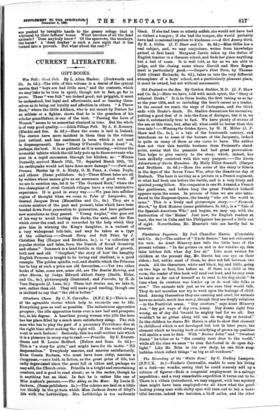Plantation Pageants. By Joel Chandler Harris. (Constable and Co. 6s.)—The
author of "Uncle Remus" has not exhausted his vein. As Aunt Minervy Ann tells the little hero of the present volume : "In der gwines on and in der windins up, dem tales tetches folk whar dey live at." Like most writers for children at the present day, Mr. Harris has one eye on their elders ; but, unlike most of them, he does not fall between two stools. All the characters, white and black, big and little, going on two legs or four, live before us. If there is a child in the room, the reader of this book will read out loud, and he may even be taken so far out of himself as to read to his dog about "de time when de creeturs was kinder up in de worl like folks is now." The animals talk just as we are sure they would talk. They do not moralise nor try to work upon the feelings of child- hood. Among themselves they are cunning and cruel, for animals have no morals, much less mercy, though they are deeply religious —in the Positivist sense. "Dey creeturs," says Aunt Minervy Ann, "dey got ways of dey own, honey. Dey dunno right fum wrong, an ef dey did 'twould be mighty bad for we all. Dey wouldn't be no gitten along wid um de way dey er treated." In the children he draws Mr. Harris is able to show that element • in childhood which is not developed but lost in later years, the element which no tracing back or minifying of grown-op qualities will enable a man to find. With " Buster John" and "Sweetest Susan" he takes us to "the country next door to the world," while all the time we seem "to sten flat-footed in de open day- light." Like Mr. Bobs in his own story, he can blow soap- bubbles which reflect things "as big as all outdoors."






















































 Previous page
Previous page